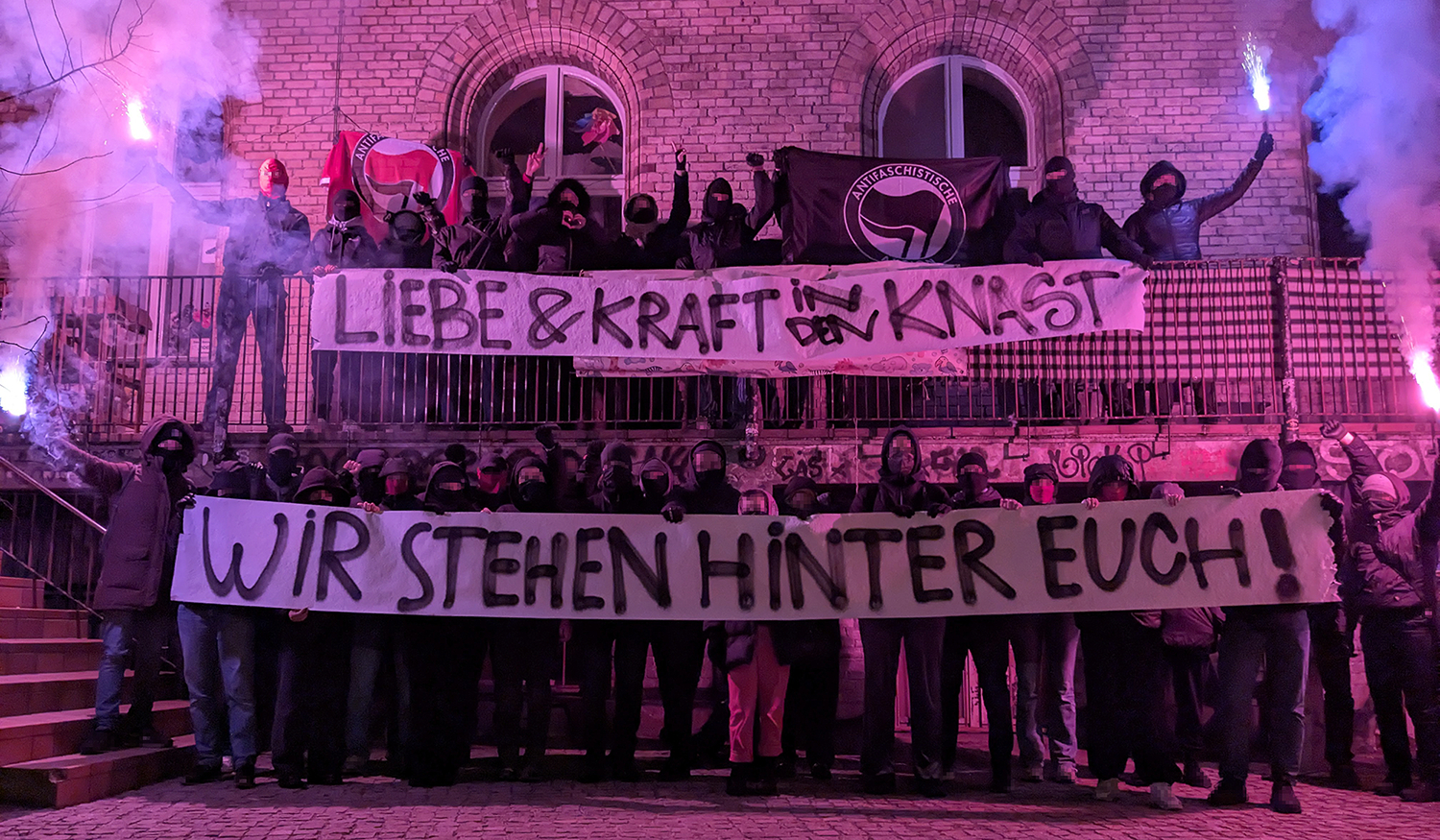Zaid A. from Nuremberg handed himself in in Cologne on Monday. The Syrian and six other anti-fascists are facing extradition to Hungary. However,they are demanding a fair trial in Germany.
Anna Busl is a specialist lawyer for criminal and migration law in Bonn. Together with Göttingen-based lawyer Rasmus Kahlen, she is representing Syrian national Zaid A. against the threat of extradition to Hungary.
Your client Zaid A. from Nuremberg is one of the seven anti-fascists who have been wanted for two years for attacks on right-wing extremists at the ‘Day of Honour’ in Hungary and who have now turned up. What happened?
Zaid turned himself in with me at the police headquarters in Cologne at around 11 a.m. on Monday. They were more than surprised. We had to wait in the foyer for an hour until the police officers gathered more information. Zaid could have left during this entire time. He didn’t.
What are the authorities accusing him of?
The Federal Public Prosecutor’s Office is conducting an investigation into the formation of a criminal organisation under Section 129 of the Criminal Code and acts of bodily harm in Budapest. According to a European arrest warrant from Hungary, he is also accused of assault there.
Unlike the six antifascists remanded in custody, Zaid A. is in extradition custody in Cologne. He has Syrian citizenship. Why is there no German arrest warrant for him?
We are also asking the Federal Public Prosecutor’s Office this question! Our client is accused of the same offences as the other six people who handed themselves in on Monday. Ultimately, the Federal Public Prosecutor General took over the investigation and obtained arrest warrants from the Federal Court of Justice for a large number of people, but not for Zaid, on the charge of forming a criminal organisation. We can therefore only state the following: The intention here is obviously to force a non-German citizen directly and immediately into extradition to a right-wing authoritarian state, Hungary, and thus into detention conditions that violate human rights and a completely unfair trial.
Why is Zaid M. still in custody at all? He turned himself in voluntarily, so there is no risk of escape …
We see it the same way. In our view, the risk of absconding can be completely ruled out.
Who will now decide whether to continue his detention? You are demanding that a fair trial on the charges be held in Germany.
In our view, the competent Public Prosecutor’s Office can and must decide that there are neither grounds for an extradition warrant nor that extradition is inadmissible. We recall the recent, clear words of the former Deputy Attorney General Cuno Jakob Tarfusser from Italy, who rightly decided with regard to Gabriele Marchesi, who was prosecuted there: No extradition to Hungary, because there are considerable doubts about the rule of law there and the relationship between the offence and the punishment is completely disproportionate. And who, in view of the decision of the Berlin Court of Appeal regarding Maja T., who was extradited from Germany, recently stated: ‘The authorities’ behaviour is appalling. It shows that in the race between law and state power, the state power has won.’
What deadlines must the judiciary now adhere to in the case of Zaid A.?
Under the Act on International Mutual Assistance in Criminal Matters, the competent court has 60 days to decide on the extradition request. However, this is a so-called ‘mandatory provision’, which means that the court can also exceed this deadline if there are good reasons to do so. This is probably the case here, as the factual and legal situation is complex. There is a similar case with the extradition proceedings of Maja T., in which the Federal Constitutional Court wanted to prevent the transfer by means of an emergency order. The main proceedings concerning the constitutional complaint have not yet been decided. There are therefore good reasons not to go through with the proceedings by hook or by crook within the 60-day deadline.
And if the extradition decision is negative for your client?
Of course we will take every legal defence available to us. In case of doubt, even before the Federal Constitutional Court.
Isn’t there a clear problem in EU legal assistance when states can do what they want, as in the case of Maja T., but those affected can hardly object?
German extradition law is based on the idea that uniform standards apply within Europe when it comes to the rule of law and the rights of the accused. However, there is no longer an independent judiciary in Hungary.
In case of extradition, a Syrian ambassador would be competent to provide consular assistance to Zaid. A. in Budapest and to press for correct conditions of detention …
It is not that easy to absolve the German government of its responsibility. Neither now nor in the event of extradition. Our client, who has protection status under the Geneva Refugee Convention, is resident here. He is to be treated like a German citizen. Zaid A. must not be extradited!
Published in German in „nd“.
Image: Solidarity action for the anti-fascists who have been arrested in Berlin (Kontrapolis).





Leave a Reply